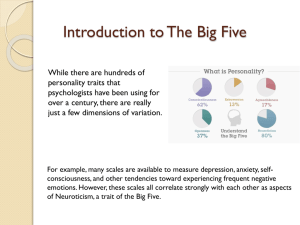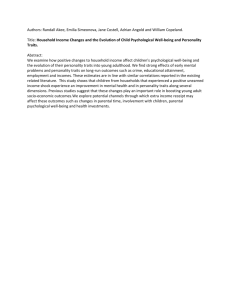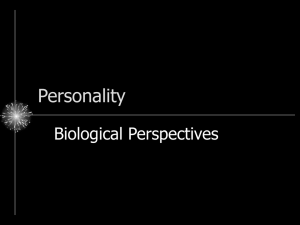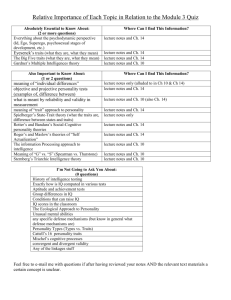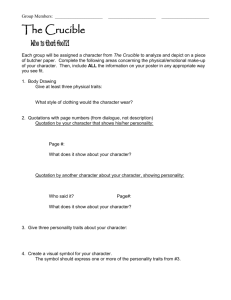Relationship between Personality Factors and Level of Forgiveness among College Students
advertisement
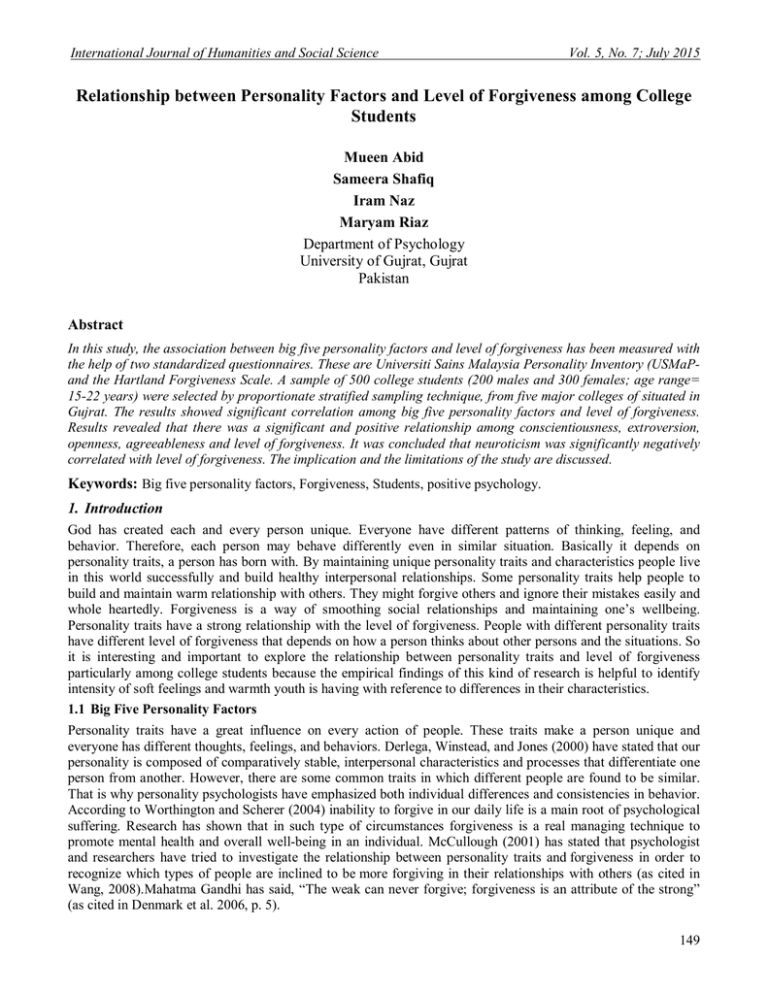
International Journal of Humanities and Social Science Vol. 5, No. 7; July 2015 Relationship between Personality Factors and Level of Forgiveness among College Students Mueen Abid Sameera Shafiq Iram Naz Maryam Riaz Department of Psychology University of Gujrat, Gujrat Pakistan Abstract In this study, the association between big five personality factors and level of forgiveness has been measured with the help of two standardized questionnaires. These are Universiti Sains Malaysia Personality Inventory (USMaPand the Hartland Forgiveness Scale. A sample of 500 college students (200 males and 300 females; age range= 15-22 years) were selected by proportionate stratified sampling technique, from five major colleges of situated in Gujrat. The results showed significant correlation among big five personality factors and level of forgiveness. Results revealed that there was a significant and positive relationship among conscientiousness, extroversion, openness, agreeableness and level of forgiveness. It was concluded that neuroticism was significantly negatively correlated with level of forgiveness. The implication and the limitations of the study are discussed. Keywords: Big five personality factors, Forgiveness, Students, positive psychology. 1. Introduction God has created each and every person unique. Everyone have different patterns of thinking, feeling, and behavior. Therefore, each person may behave differently even in similar situation. Basically it depends on personality traits, a person has born with. By maintaining unique personality traits and characteristics people live in this world successfully and build healthy interpersonal relationships. Some personality traits help people to build and maintain warm relationship with others. They might forgive others and ignore their mistakes easily and whole heartedly. Forgiveness is a way of smoothing social relationships and maintaining one’s wellbeing. Personality traits have a strong relationship with the level of forgiveness. People with different personality traits have different level of forgiveness that depends on how a person thinks about other persons and the situations. So it is interesting and important to explore the relationship between personality traits and level of forgiveness particularly among college students because the empirical findings of this kind of research is helpful to identify intensity of soft feelings and warmth youth is having with reference to differences in their characteristics. 1.1 Big Five Personality Factors Personality traits have a great influence on every action of people. These traits make a person unique and everyone has different thoughts, feelings, and behaviors. Derlega, Winstead, and Jones (2000) have stated that our personality is composed of comparatively stable, interpersonal characteristics and processes that differentiate one person from another. However, there are some common traits in which different people are found to be similar. That is why personality psychologists have emphasized both individual differences and consistencies in behavior. According to Worthington and Scherer (2004) inability to forgive in our daily life is a main root of psychological suffering. Research has shown that in such type of circumstances forgiveness is a real managing technique to promote mental health and overall well-being in an individual. McCullough (2001) has stated that psychologist and researchers have tried to investigate the relationship between personality traits and forgiveness in order to recognize which types of people are inclined to be more forgiving in their relationships with others (as cited in Wang, 2008).Mahatma Gandhi has said, “The weak can never forgive; forgiveness is an attribute of the strong” (as cited in Denmark et al. 2006, p. 5). 149 ISSN 2220-8488 (Print), 2221-0989 (Online) ©Center for Promoting Ideas, USA www.ijhssnet.com On the basis of the variability in the behavior of people, researchers have differentiated between states and traits. A state is a temporary reaction of a person to any current situation. Traits are enduring and permanent patterns of behavior. These traits reflect individual differences (Derlega, Winstead, Jones, 2000). Personality traits have a great impact on people’s behavior either in positive or negative direction. Mischel (1968) has described human personality as existing within a strong harmony and has classified traits on the basis of “Big Five” personality dimensions. The measurements were developed from the study of the natural terms people use in their native language to communicate to communicate with each other, to measure the personality traits (John, Nauman, & Soto, 2008). The classification of personality traits is usually denoted as OCEAN. The word “OCEAN” is a shortening for the name of five factors. These five different factors are known as the “Big 5”. Big five factors are Extraversion, Agreeableness, Conscientiousness, Neuroticism, and Openness (Ewen,1998; Costa & McCrar, 1992). Figure 1.1 Big Five Personality Factors and Underlying Traits (Costa &McCrar, 1992) 1.2 Forgiveness Today’s researchers have dedicated a great deal of consideration to the issue of forgiveness (Inrig, 2006). Forgiveness is defined as a procedure that involves a change in feelings, sentiment, and thoughts about a wrongdoer. It is a deliberate and charitable procedure determined by a conscious choice to pardon an offender. This procedure occurs as a result of reduced inspiration to hit back a criminal regardless of his or her engagements. Therefore, the needs arose in a forgiver to reduce negative emotions related with a wrongdoer. Forgiveness is a gradual process (Denmark et al. 2006). Forgiveness turned out to be a blessing as it took away a person out for all of our inner troubles. In various situations, forgiveness lessens depression, improves our selfesteem and wipes out past pains (Engel, 2001). The process of forgiveness is very complicated and time taking process. Apologies are often considered to be more important first step for a true forgiveness. That is not impossible but very painful and difficult, for those people who have been wound, they have to forget and forgive a sinner even if a significant excuse is not forthcoming from him or her (Engel, 2001). Forgiveness is very important for curing different psychological problems by brining positive changes in one’s emotions, to get better physical and mental health and in order to resolve different conflict among individuals and diverse type of groups (Denmark et al. 2006). It is considered to be a very important factor to keep relationships smooth and healthy with others as it has a lot of benefits on physical and mental health of people. People, who do not forgive, create a lot of difficulties for their self and others and they cannot maintain their relationship. Therefore it is important to explore that which personality traits have more tendencies to forgive. The major goal of the present study is to examine a correlation between big five personality factors and level of forgiveness among students. 2. A Review of Empirical Research The purpose of thestudy was to identify association and strength of each of personality trait variables as related with the ability of forgiveness among college students. Hafnidar (2013) has conducted a research to identify relationship between five factor of personality and forgiveness. 150 International Journal of Humanities and Social Science Vol. 5, No. 7; July 2015 Results of study indicated that agreeableness was much positively linked to forgiveness of self and forgiveness of others. Likewise, extraversion and conscientiousness was also positively correlated to forgiveness. Wang (2008) conducted a study in order to identify correlation between forgiveness and big five personality factors on Taiwanese college students. And result of study indicated that agreeableness and neuroticism were significantly related to forgiveness measure. Al -Sabeelah, Alraggad and Ameerh, (2014) conducted a research on personality traits and level of forgiveness on 450 Jordanian university students. The results of study showed a positive and a significant correlation between personality traits and level of forgiveness other than neuroticism. Rangcanadhan and Todorov (2010) have administered a self-report questionnaire on 59 participants, suggesting that personality traits have a great impact on the decision related to forgiveness. The hypotheses of the present study are: H1: Students whose personality traits fall in the category of extroversion and conscientiousness will have a moderate tendency to forgive. H2: Students whose personality traits fall in the category of openness and neuroticism will have low tendency to forgive. H3: Students whose personality traits fall in the category of agreeableness will have high tendency to forgive. 3. Materials and Methods The research design comprised of correlational survey method. 3. 1. Sample The study was conducted on 500 college students of Gujrat (300 females and 200 males) with age range of 15 to 25 years. In first step, five Government girls and boys colleges of Gujrat were randomly selected. Fatima Jinnah College, Marghzar College, Government Sir Syed College were included in the category of girls’ colleges. Zamindar College and Science College were included in the category of boys’ colleges. In second stage inclusion and exclusion criteria was decided. All the students from F.A and B.A programs (Undergraduates) were included and all the students from master classes (Gragudates) were not included in this study. In third stage proportionate stratified sampling technique was used for the selection of the sample of study. 3.2. Instruments One demographic sheet and two standardized questionnaire were used in order to collect data. Demographics data about students related to gender, age, class, department and Institution was collected. These characteristics were chosen on the basis of the review of literature. In order to collect data about big five personality factors “USM” Personality Inventory (USMaP-i) was used. This scale was developed Yusoff and Ahmad in (2010). It consisted of 60 items, measuring conscientiousness, extroversion, openness, agreeableness and neuroticism. It was a five point likert scale. To measure the level of forgiveness Heartland Forgiveness Scale was used. It consists of 18 items and it was a 7 point likert scale. This scale was developed by Laura, Snyder, and Hoffman in 2005. 3.3. Procedure For the collection of data, permission was taken from the principals of selected colleges and from the authors of standardized questionnaires. Sample of study was selected by using proportionate stratified sampling technique. After the selection of sample, questionnaires were distributed to the students individually. The purpose of the studywas elaborated to the respondents and informed consent was taken. The items appearing difficult to the respondents were discussed. It was conveyed to respondents that their personal information would be kept confidential. Data were collected in five weeks. After the collection of data, data were analyzed and interpreted. SPSS.16 was used for the interpretation of data. 151 ISSN 2220-8488 (Print), 2221-0989 (Online) ©Center for Promoting Ideas, USA www.ijhssnet.com 4. Results Table.4. 1: Frequencies and Percentage of Demographics Variables of Respondents (N = 500) Variables Categories f % Gender Male Female 15-20 20-25 1st year 2nd year 3rd year 4th year Associate Degree Art Pre-medical Commerce Education IT Islamic Studies Pre-engineering General Science BSC F.J College Sir SayedCollege Science College MargzarCollege ZamindarCollege 200 300 372 128 211 185 45 29 30 294 88 65 2 10 4 3 13 21 101 99 100 40 60 74.4 25.6 43 37 9 5 6 58.8 17.6 13 .4 2 .8 .6 2.6 4.2 20.2 19.8 20 Age Class Departments Colleges 100 20 100 20 Table no 1 shows frequencies and percentage of students for their gender, age, class, department and institution. In above table there were 40 % males and 60 % females and the most frequent age range of the respondents was 15-20 years. It was identified that more respondents were from 1st year art group and a large respondents were taken from Fatima Jinnah College as compare to other colleges. Table 4.2: Correlation between big five Personality Factors and Forgiveness (N = 500) Variables Forgiveness Sig. Conscientiousness .464** .000 Extroversion .444** .001 Openness .206** .000 agreeableness .897** .000 neuroticism -.207** .001 ** p = 0.01. Table.2 represents correlation between big five personality factors and forgiveness. Spearmen correlation was used in order to identify correlation between personality factors and level of forgiveness. Results show a significant correlation between personality factors and forgiveness. It is identified that conscientiousness, extroversion, openness and agreeableness are significantly and positively correlated to forgiveness. There is a significant negative relationship between neuroticism and forgiveness. On the basis of above results, it is concluded that agreeableness personality trait is strongly related with the forgiveness while extroversion and conscientiousness are moderately correlated to forgiveness. It can be concluded that level of forgiveness is low in students with high neurotic tendencies. Further, there is low level of relationship between openness and extroversion with the forgiveness among college students. 5. Discussion The first hypothesis of the current study was, “Students whose personality traits fall in the category of extroversion and conscientiousness will have moderate tendency to forgive”. 152 International Journal of Humanities and Social Science Vol. 5, No. 7; July 2015 So in the light of present results it was concluded that there is a significant moderate level of relationship among extraversion (r = .444**), conscientiousness (r = .464**) and level of forgiveness (see table no 1 and 2). Therefore, hypothesis is accepted. The second hypothesis of the current study was, “Students whose personality traits fall in the category of openness and neuroticism will have a low tendency to forgive.” The value of correlation coefficient indicating that there was a significant positive low level of relationship between openness (r = .206**) and forgiveness. While, there was a significant negative low level of relationship between neuroticism (r = -.207**) and forgiveness (see table no 4 and 6). These results supported the hypothesis of current study. The third hypothesis of the current study was that “Students whose personality traits fall in the category of agreeableness will have high tendency to forgive.” Findings of study indicated that agreeableness personality traits (r = .897**) are highly correlated with level of forgiveness (see table no 5). These results supported the hypothesis of present research. Overall it is concluded that respondents who scored high on agreeableness personality traits also scored high on forgiveness measure. The students with agreeableness personality traits have high tendency to forgive. On the other hand, students with conscientiousness and extroversion personality traits have moderate tendency to forgive but not highly correlated. The students with extroversion and openness personality traits havelow tendency to forgive others. However, neuroticism is negatively correlated with level of forgiveness. The Finding of the present study are supported by the previous researches (Maltby et al., 2008; McCullough, 2001) as these have identified that people with agreeable and emotionally stable traits have a high tendency to forgive. The findings of this research are very applicable to bring the social change and to increase the understanding of parents and teachers about different personality traits as it plays role in the level of forgiveness among youth. 5.1. Conclusions Present study concluded that conscientiousness, extroversion, openness and agreeableness are positively correlated with level of forgiveness. Neuroticism is negatively correlated with forgiveness measure. All the hypotheses of this study were accepted. It is identified that big five personality factors are an important predictor of the level of forgiveness among college students. The findings of this study are very important for the betterment of social relationship of students. This study is very applicable for teachers and parents to increase understanding of personality traits that promote level of forgiveness. By promoting forgiveness life can be saved from a lot of conflicts. 5.2. Limitations and Suggestion of the Study The important limitation of the study was that private colleges and master level students were not included in research because of limited time period. Due to above limitations it was suggested that all the private colleges and master level students should be included in further research. The sample should be taken from diverse type of population in order to improve the generalize ability of research. There should be enough time and resources in order to conduct research. 153 ISSN 2220-8488 (Print), 2221-0989 (Online) ©Center for Promoting Ideas, USA www.ijhssnet.com References Al-Sabeelah, A. M. S., Alraggad, F. A., & Abu Ameerh, O. (2014). The relationship between forgiveness and personality traits, mental health among sample Jordanian university students.International Journal of Education and Research, 2 (9).217-228. Denmark et al. (2006). Forgiveness: A sampling of research results. Washington, DC: Office of International Affairs. Derlega, V. J., Winstead, B. A., & Johns, W. H. (2000). Personality: Contemporary theory and research (3rded.). New York: Wiley. Engel, B. (2001). The power of apology: Healing steps to transform all your relationship. Canada: Navta Associates. Ewen, R. B. (1998). Personality: A topical approach. Mahweh, NJ: Erlbaum. Fetzer institute. (2011). Conversation about forgiveness: Facilitator guide. Hafnidar. (2013). The relationship among five factor model of personality, spirituality, & forgiveness. International Journal of Social Science &Humanity, 3 (2), 167-170. Inrig, G. (2006). What is true forgiveness? USA: Discovery house publishers. John, O. P., Naumann, L. p., & Soto, C. J. (2008). Paradigm shift to the integrative Big Five trait taxonomy: History, measurement, and conceptual issues. In O.P. John, R. W.Robbins, & L. A. Pervin (Eds.), Handbook of personality: Theory and research (pp. 114-158). New York, NY: Guilford Press. Maltby, J., Wood, A. M., Day, L., Kon, T. W. H., Colley, A., & Linley, P. A. (2008). Personality predictors of levels of forgiveness two and a half year after transgression.Journal of Research in Personality, 42, 10881094. McADAMS, D. P. (2002). The Person: An integrated introduction to personality psychology(3rd ed.). New York: Wiley. McCullough, M. E. (2001). Forgiveness: Who does it and how do they do it? Current directions in Psychological Science, 10 (6).194-197. Mischel, W. (1968). Personality and assessment. (1sted). New York: Wiley. Rangcanadhan, A. R., &Todorov, N. (2010). Personality and self-forgiveness:The roles of shame, guilt, empathy and conciliatory behavior. Journal of Social and Clinical Psychology, 29 (1),1-22. Wang, T. W. (2008). Forgiveness and Big Five personality traits among Taiwanese undergraduates.An International Journal of Social Behavior & Personality, 36 (6).849-850. 154

